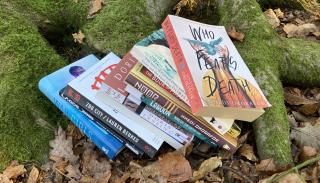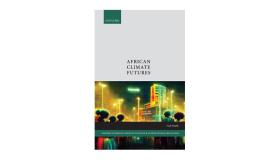Can we imagine what a future climate-changed world will be like?

The politics of climate change is inherently future-oriented. Climate science rests upon modelling the effects of past and present greenhouse gas emissions on future global temperatures. International agreements and national policies trade on future mitigation and adaptation scenarios. Activists march for ‘future generations’ and the ‘future of all life on Earth.’ But the future is inherently uncertain and unknowable and any attempt to envision it involves a necessary leap of the imagination.
This imaginative dimension requires – or, at least, should require – novel and creative methods for researching climate futures. In my recent book, African Climate Futures, I suggest that we can read official climate strategies and climate fiction novels side-by-side as ways to interrogate the discourses, assumptions, gaps, and blind-spots of dominant climate narratives.
Science fiction and speculative fiction are becoming increasingly popular methodological resources for political theorists and social scientists. Reading and studying stories can help us to understand who we are and how we got here; see the world from other perspectives, including imagining nonhuman worldviews; and hold up a mirror to the world we live in. Fiction is a powerful tool for stimulating theoretical and ethical reflection, and imagining other ways of living. As such, reading climate fiction stories can be far more than either an entertaining distraction or a communication strategy for scientists and policymakers to change public attitudes and behaviours.

African climate stories
At the heart of this book is the claim that stories have power. They shape how we see the world and our role in it. They are constitutive, worldmaking. And therefore, as Donna Haraway insists, ‘[i]t matters what stories make worlds, what worlds make stories.’ Climate fiction – or ‘cli-fi’ as it has been dubbed – has the potential to diversify the stories that are told within mainstream climate politics, but the growing genre of climate fiction is still overwhelmingly European and North American in focus. A core aim in my research is therefore to centre African authors and stories about climate change.
I start by examining the narratives underpinning the official long-term climate strategies submitted to the UNFCCC by Ethiopia, The Gambia, Nigeria, South Africa, and Zimbabwe. Whilst they have some important differences, there are also many shared assumptions and storylines and some important and surprising omissions. These tend to be technical and depoliticised texts, with no space for nonhuman nature, no discussions of climate reparations, and no attempt to convey what the future will be like for those who will live in it.
To redress these limitations I turn to a range of Africanfuturist novels, short stories, and films to reimagine major debates about the places, temporalities, ecologies and politics of climate futures. I discuss novels by Lauren Beukes, Doris Lessing, Alistair Mackay, Nnedi Okorafor, and Tochi Onyebuchi and short stories by Terh Agbedeh, Mame Bougouma Diene, Osahon Ize-Iyamu, Vuyokazi Ngemntu, Nnedi Okorafor, Suyi Davies Okungbowa, Chinelo Onwualu, Tlotlo Tsamaase, and Jessica Wilson. I also discuss the films Black Panther and Pumzi. These stories range from post-apocalyptic compounds in East Africa to gleaming eco-cities and forested villages in West Africa, from wind- and solar-powered civilisations in North Africa to more-than-human suburbs and cyborg enclaves in Southern Africa.
Political implications
The diversity of these stories means there is a lot that can be drawn from them, and indeed pluralising and diversifying the stories we tell about climate politics is a central aim of the book. Here, I’ll focus on three key implications I think are particularly important for contemporary climate politics.
First, these stories insist we attend to the ongoing role of the past in the present and future. Many of these stories reflect upon how the past is not fixed but can be reshaped, memorialised, repaired, and honoured. This lends weight to calls for redressing Loss and Damage within the UNFCCC processes, but also demands we go much further. Financial reparations, although needed on a scale far beyond what is currently on offer, are not enough. World-remaking reparations require cultural critique, a shift in values and power relations, and pluralizing of imagined futures. Paying our debts means thinking not just in human terms but also about more-than-human and posthuman relations.
Second, these stories have implications for how we imagine forms of political agency. Many of the heroes of these tales are young, black, and female. Some are queer, some are disabled or neuro-diverse, many are flawed or outcast. They diversify the dominant political subjectivities of climate change politics. Many of these stories are hopeful in that they don’t imagine climate change away or propose ‘solutions’, but their heroines struggle to survive, change, and tell their stories to future generations.
Third, this book is an assertion that stories are important. We are a story-telling species, homo narrans, and our political life is structured by narratives. Instead of remaining within our comfort zones, writing, reading and listening to familiar stories about climate politics, we need more stories about climate reparations and revolutions, and how they might reshape identity, memory, and trauma. We need to tell – and listen to – stories that interrogate racism, Whiteness, patriarchy, homophobia, ableism, and speciesism much more prominently than in mainstream climate politics or the mainstream climate fiction canon. Alexandria Ocasio-Cortez tells us that ‘our future has not been written yet’; rather, I would say that rewriting our futures is always possible.
Bio: Carl Death is a Senior Lecturer in International Political Economy at the University of Manchester. His research focuses on environmental politics in Africa, with a particular interest in critical and postcolonial approaches. His books include African Climate Futures (Oxford University Press, 2025), The Green State in Africa (Yale University Press, 2016), and Governing Sustainable Development: Partnerships, Protests and Power at the World Summit (Routledge, 2010).
Top image: the author's own